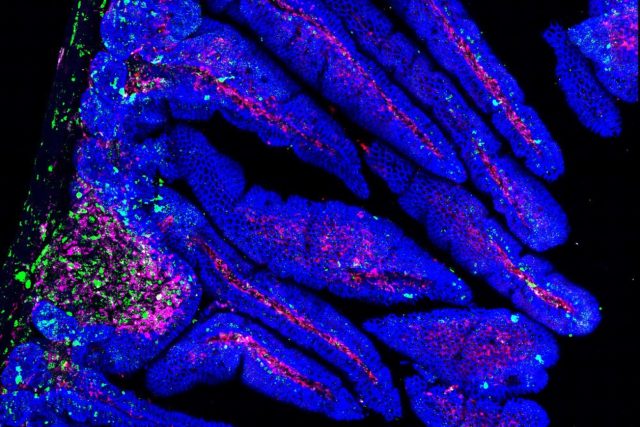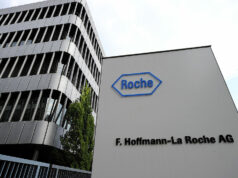
Scientific understanding of how humans interact with the bacteria within them is leading to a new wave of medicines addressing the bugs in our guts. Though these microbiome therapies are novel, they’re just scratching the surface of the science. Humans evolved with bacteria, all the while sharing information via molecules that move between them, according to Guillaume Pfefer, CEO of startup Senda Biosciences.
“It’s communication, it’s signaling—at the cellular level,” said Pfefer, who is also a partner at Flagship Pioneering.
This molecular exchange has implications for human health. Senda has been analyzing these interactions, gleaning insight into why they matter and how they can be targeted with a drug for a therapeutic purpose. The Cambridge, Massachusetts-based company has a pipeline of drug candidates being readied for clinical testing next year and it has raised $55 million in financing to support that work. The new capital announced Thursday is an extension of a Series B financing, bringing that round’s total to $98 million.
Senda was founded in 2019 by Flagship, a venture capital firm whose labs have spawned new life sciences startups across the spectrum of life sciences, including the microbiome. Initially, Senda aimed to address the challenges of transferring a therapeutic payload across biological barriers.
Pfefer, whose industry experience includes senior roles at GlaxoSmithKline and Synologic, said that while Senda builds on nearly 15 years of microbiome research his company is not a microbiome company. Senda analyzes the genetic profiles of bacteria and learns about the molecules they produce and how they interact with humans. All of the research produces a large amount of data, which are analyzed with artificial intelligence and machine-learning techniques. From there, the company tries to learn how to intervene in that interaction. This study of interspecies interactions is a new area of research that Senda calls intersystems biology.
Some of what is now Senda comes from Kintai Therapeutics, a Flagship startup that was founded in 2016. Kintai was not a microbiome therapies company either. When it emerged from stealth two years ago, it was developing small molecules based on an understanding of how bacteria in the gut and the substances they produce affect human health. That sounds a lot like what Senda is trying to do now.
Senda’s pipeline has three programs being readied for clinical testing. The first addresses bacteria that produce trimethylamine N-oxide, or TMAO. Research has found that high levels of this compound are associated with a higher risk of cardiovascular problems. Senda has designed a molecule that blocks the process by which TMAO is produced.
The second Senda program is for metabolic diseases, including obesity and glycemia. The company aims to intervene in the pathways between bacteria and humans that play a role in obesity and liver health. This research is being conducted with Nestlé Health Science under a partnership that was announced early this year. Under the agreement, Senda will do the early clinical research, including toxicology studies. Nestlé will conduct the remaining clinical research, as well as commercialization. The agreement grants Nestlé rights to consumer applications of products that emerge from the research while Senda retains the rights for any therapeutic applications, Pfefer said.
The third Senda program addresses cancer. Many patients do not respond to a class of immunotherapies called checkpoint inhibitors. A growing body of scientific research is pointing to the role that bacteria play in the efficacy of these cancer drugs. Senda has designed molecules to block a substance produced by bacteria that could in turn potentially increase a patient’s response to checkpoint inhibitors.
The new capital will support the three Senda programs on track for the clinic. Pfefer said that the cash will also support continued development of the company’s technology, including research into how humans interact with the plants that they eat. These plants transfer molecular content from their cells to ours. Pfefer said understanding this transfer could unlock ways to transfer therapeutic cargo, such as messenger RNA, to tissues of the body that cannot be reached by currently available technologies. Nucleic acids, proteins, and peptides are large molecules that can’t be made into pills, so these medicines are typically injected or infused. Senda’s research into how plants transfer material could lead to a way to deliver these large molecules as oral drugs.
The new funding will enable Senda to expand its headcount from 64 to about 80 employees by the end of this year, Pfefer said. The startup is also looking to partner with more companies. Pfefer said Senda’s platform has the potential to address many therapeutic areas and his company can’t be expert in all of them. The goal is to find the collaborators best suited to develop these new therapies and bring them quickly to patients, he said.
To date, Senda has raised $143 million total. The expansion of the Series B round of funding includes the participation Flagship, as well as new investors Longevity Vision Fund, Terra Magnum Capital Partners, Mayo Clinic, Partners Investment, and Mint Venture Partners. Earlier investors Alexandria Venture Investments and State of Michigan Retirement System also participated.








